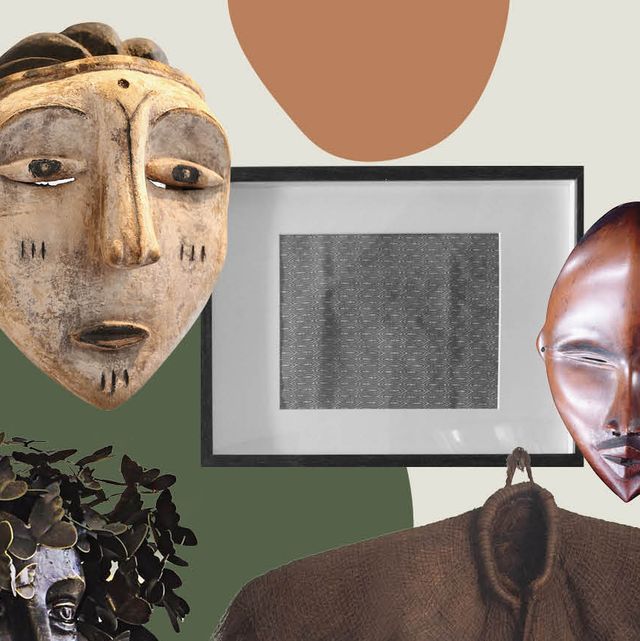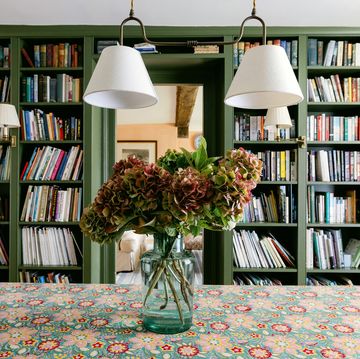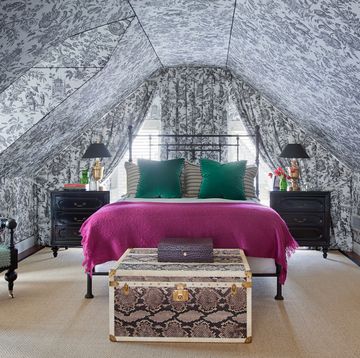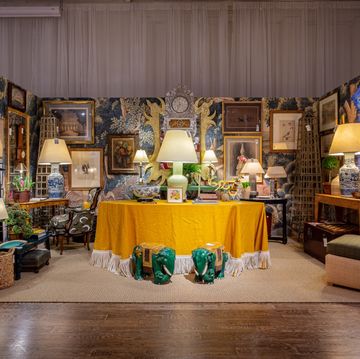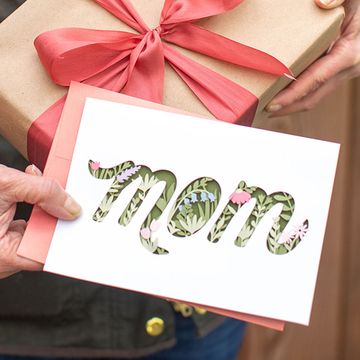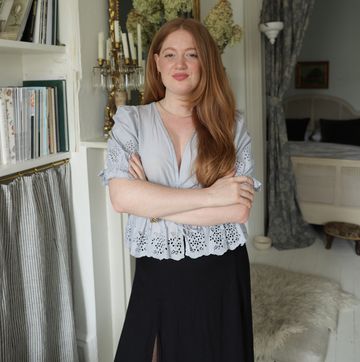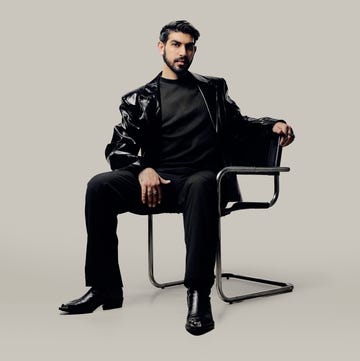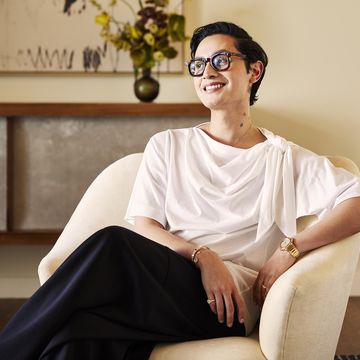The Dallas Museum of Art is home to an extensive African mask collection. In the virtual exhibition, curator Roslyn A. Walker speaks thoughtfully about the spiritual value of masks and their use in religious dance and public performances:
“An image of an African mask first appeared in the central Sahara thousands of years ago. The Stone Age inhabitants left a record of their presence in rock art at Tassili-n-Ajjer, Algeria, where they painted a human figure whose size and features are exaggerated. The figure is interpreted as a masked dancer wearing a knotted costume. Through this disguise, the dancer has been transformed into a deity or spirit. Whatever the purpose of the disguise, scholars cite this painting, which is dated 8000 to 6000 BCE, as the earliest evidence for one of the most important of all African art forms: masks. Carved wooden masks are a highly developed and enduring African art form that is valued for its expressive qualities.”
Ornate and spiritually endowed, it’s no wonder that masks have become a mainstay in the body of tourist art and exported artifacts from all over the content. But is that ethical?
Masks are a particularly complicated battleground to come to terms with given the long history of Western extraction of such items for display in museums and private collections. As French President Emmanuel Macron declared in 2017, “I cannot accept that a large part of cultural heritage from several African countries is in France…African heritage can no longer be the prisoner of European museums.”
One by one, several research institutions and public museums in the US and Europe have slowly followed Macron's lead. Recently and publicly, the Netherlands and Germany declared their plans to return stolen colonial relics on a variety of moral grounds. The about-face of major cultural institutions has ushered in the conversations at galleries, auctions, and dinner tables about the ethics of extracting antiques, especially ones of spiritual value, from the communities that created them.
On an individual level, ethical travelers and art collectors are left wondering: Is there a way to responsibly stage a mask crafted in Africa as decoration? Is it predatory to buy an old mask during a visit to the continent? Is it problematic to use ceremonial pieces as decor in a modern home? These very valid questions strike at the core of ethical debates about the use of authentic masks outside of their place of origin.
Judy Dinnerman of African Masks Plus gallery in New Hope, Pennsylvania, says she “always talks with customers about placing masks on the walls of their homes instead of flat painting or prints. The masks were carved by artists and represent life in many cases. The masks are spiritual and add a three dimensional design to the walls. Masks have a life of their own and add interest, intrigue, design and make a room feel warm, interesting, and inviting...Every mask brings a personality and a mood that is dynamic and exciting.”
Dinnerman personally travels to collect from craftsmen in countries like Ghana, Togo, Benin, Ivory Coast, Kenya, Tanzania, Rwanda, South Africa, Botswana, and Zimbabwe. And early next year, she’s off to Congo, Cameroon, Mali, and Nigeria to add to the over 1,000 piece collection of sculptures, masks, and crafts in her gallery. The very act of sourcing from those who make the work is important. Not only does this responsibly allow collectors to identify the specific origins of the piece they bought, but it ensures that those who labored to make it directly benefit from the resale. After all, this ethical question isn’t just about the spiritual element of the masks, it is also about the economics of Africa’s art markets.
Many travelers buy tourist art that replicates the look of an original. Those masks tend to be purely decorative and have never been used in a ceremony. Skilled mask maker and performance artist Julio Leitão reassures would-be owners that even the replicas “serve to educate people about who we are. They don't have to mean anything as long as you like the way they make you feel in your house. They can be just decorative.” Originally from Angola, Leitão produces art that is inspired by his childhood memories of authentic Luba masks, used in ritual performances for protection and connection with ancestral spirits. Today, his stylized works are aesthetically contemporary. They are deliberately designed for dramatic effect and there’s no mistaking his originals for something you might come across in a market in Accra or Kigali. Buyers of modern work certainly remove the ethical tension around purchasing a piece that claims to be authentic.
Leitão says that many skilled craftsmen make such claims as a marketing tactic. Burying a replica for months or burning it with vinegar might give a perfectly new mask the look and feel of an antique. As disingenuous as it might be, the practice of driving up the price helps many struggling artists make enough money to feed their families and to continue their craft. Due to limited interest among domestic buyers, artists and artisans on the continent suffer from an over-dependence on highly volatile foreign tourism. Socioeconomic inequality creates severe power imbalances between a potential buyer and a seller. This imbalance can be even more true of those who choose to sell family heirlooms that actually are authentic.
In many tourist markets, it is actually quite hard to come across a truly authentic ceremonial mask. The deliberate search for a real one would require quite an appreciation for art history and a penchant for cultural literacy. As Leitão says, “a lot of those things are no longer being used, because modern society has killed traditions. So the alternative is to put [a mask] someplace where they can be used to educate the next generation about the value and preservation of our own selves and our own identity.” In these cases, collectors might become a guardian of an evolving culture, but it’s worthwhile to interrogate any sense of paternalism that comes with that perspective.
A long history of pillaging and appropriation of crafts and culture from Africa make mask-selling and mask-owning ever-controversial. Very few people would sell such an important item if they could make a livelihood otherwise. And if the purpose of buying an authentic piece is the profit in a resale, then that is continuing a cycle of cultural extraction that the continent has endured for centuries.
“Colonialism hasn’t ended that long ago. I'm still alive, and I lived under colonialism,” reminds Leitão, who was born under Portuguese imperialism. It was only in 1975 that Angola, Mozambique, Guinea Bissau, São Tomé and Príncipe, and Cape Verde got their independence. “When you’re speaking about masks, you’re really speaking about everything. It’s not an isolated discussion...It’s about a system," reiterates Leitão.
When acquired and displayed with respect for the people who made them, masks and the motifs they inspire can be a true nod to the indigenous cultures they come from. Percy Maimela, a contemporary South African artist, uses masks in his drawings because he feels they represent Ubuntu, the South African idea that loosely translates to "humanity."
Using his framework, contemporary artists and collectors don’t need to look to the Gods to measure the value of their work. When considering the ethics of owning a ceremonial mask, it is a moral imperative that buyers take stock of human history and weigh their intentions within that larger context. “No matter where we are in the world, the truth is that we are part of humankind, and in that I believe our lives are influenced by the past, present, and the future," says Maimela.
That continual lineage plays into his own work: "I came up with a mask that has fingerprint lines to represent DNA, which symbolizes our history," he says. "The aerodynamic shape of the mask is a symbol of future and focus. This shape is to also emphasize that one can create their own path.” For Maimela, masks serve a moral function as a practical reminder that “our lives are for a greater purpose than for our selfish individuality. Therefore, we need to know our actions will always affect other people.”
The long overdue institutional repatriation of incredibly rare and valuable works is certainly a recognition of the truth behind his words. Yet, individual ownership of ceremonial and antique masks still sits firmly at the epicenter of ethical debates over cultural appropriation versus appreciation.
Like the masks themselves, this debate is both historical and enduring—and its meaning often more complex than first glance might suggest.
Follow House Beautiful on Instagram.
Nafeesah Allen is an independent researcher with an interest in literature, gender, and diaspora studies in the global South. In 2019, she completed her Ph.D. in Forced Migration from the University of the Witwatersrand (Wits) in Johannesburg, South Africa. She leads BlackHistoryBookshelf.com, a book review website that highlights global Black histories organized by language, theme, and country. Follow her on Twitter or Instagram @theblaxpat.
